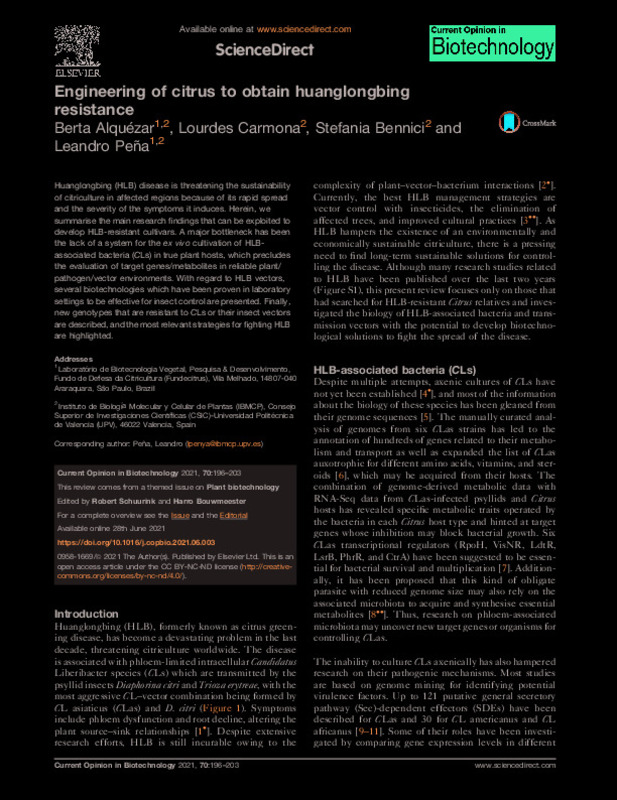JavaScript is disabled for your browser. Some features of this site may not work without it.
Buscar en RiuNet
Listar
Mi cuenta
Estadísticas
Ayuda RiuNet
Admin. UPV
Engineering of citrus to get Huanglongbing resistance
Mostrar el registro sencillo del ítem
Ficheros en el ítem
| dc.contributor.author | Alquézar-García, Berta
|
es_ES |
| dc.contributor.author | Carmona, Lourdes
|
es_ES |
| dc.contributor.author | Bennici, Stefania
|
es_ES |
| dc.contributor.author | Peña, Leandro
|
es_ES |
| dc.date.accessioned | 2022-11-12T19:02:45Z | |
| dc.date.available | 2022-11-12T19:02:45Z | |
| dc.date.issued | 2021-08 | es_ES |
| dc.identifier.issn | 0958-1669 | es_ES |
| dc.identifier.uri | http://hdl.handle.net/10251/189663 | |
| dc.description.abstract | [EN] Huanglongbing (HLB) disease is threatening the sustainability of citriculture in affected regions because of its rapid spread and the severity of the symptoms it induces. Herein, we summarise the main research findings that can be exploited to develop HLB-resistant cultivars. A major bottleneck has been the lack of a system for the ex vivo cultivation of HLB-associated bacteria (CLs) in true plant hosts, which precludes the evaluation of target genes/metabolites in reliable plant/pathogen/vector environments. With regard to HLB vectors, several biotechnologies which have been proven in laboratory settings to be effective for insect control are presented. Finally, new genotypes that are resistant to CLs or their insect vectors are described, and the most relevant strategies for fighting HLB are highlighted. | es_ES |
| dc.description.sponsorship | This work was funded by EU H2020 Innovation Action Program (grant #817526), by the Fundo de Defensa da Citricultura (Fundecitrus) and by project PID2019-104569RB-I00 from the AEI-Spain. Because of space limitations only some research publications on HLB from last two years are cited. | es_ES |
| dc.language | Inglés | es_ES |
| dc.publisher | Elsevier | es_ES |
| dc.relation.ispartof | Current Opinion in Biotechnology | es_ES |
| dc.rights | Reconocimiento - No comercial - Sin obra derivada (by-nc-nd) | es_ES |
| dc.subject.classification | BIOQUIMICA Y BIOLOGIA MOLECULAR | es_ES |
| dc.title | Engineering of citrus to get Huanglongbing resistance | es_ES |
| dc.type | Artículo | es_ES |
| dc.identifier.doi | 10.1016/j.copbio.2021.06.003 | es_ES |
| dc.relation.projectID | info:eu-repo/grantAgreement/AEI/Plan Estatal de Investigación Científica y Técnica y de Innovación 2017-2020/PID2019-104569RB-I00/ES/MEJORA GENETICA DE PORTAINJERTOS CITRICOS PARA GENERAR RESISTENCIA A VIEJAS Y NUEVAS ENFERMEDADES EMERGENTES/ | es_ES |
| dc.relation.projectID | info:eu-repo/grantAgreement/EC/H2020/817526/EU | es_ES |
| dc.rights.accessRights | Abierto | es_ES |
| dc.contributor.affiliation | Universitat Politècnica de València. Instituto Universitario Mixto de Biología Molecular y Celular de Plantas - Institut Universitari Mixt de Biologia Molecular i Cel·lular de Plantes | es_ES |
| dc.description.bibliographicCitation | Alquézar-García, B.; Carmona, L.; Bennici, S.; Peña, L. (2021). Engineering of citrus to get Huanglongbing resistance. Current Opinion in Biotechnology. 70:196-203. https://doi.org/10.1016/j.copbio.2021.06.003 | es_ES |
| dc.description.accrualMethod | S | es_ES |
| dc.relation.publisherversion | https://doi.org/10.1016/j.copbio.2021.06.003 | es_ES |
| dc.description.upvformatpinicio | 196 | es_ES |
| dc.description.upvformatpfin | 203 | es_ES |
| dc.type.version | info:eu-repo/semantics/publishedVersion | es_ES |
| dc.description.volume | 70 | es_ES |
| dc.identifier.pmid | 34198205 | es_ES |
| dc.relation.pasarela | S\459832 | es_ES |
| dc.contributor.funder | European Commission | es_ES |
| dc.contributor.funder | Agencia Estatal de Investigación | es_ES |








